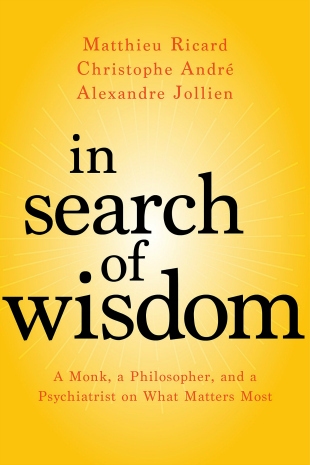Wisdom is our collective learning through the ages. People of all ages are hungry for deeper and richer sources of wisdom, a spirituality that speaks to the issues of the day and the maturation of our inner self.
This vibrant resource is written by three accomplished and knowledgeable teachers. Matthieu Ricard is a bestselling author, Buddhist monk, and interpreter for His Holiness the Dalai Lama. Alexandre Jollien is a philosopher and writer who has spent 17 years in a home for the physically disabled. Christophe Andre is a psychiatrist whose expertise is in the psychology of the emotions.
After reading this soulful and mind-expanding philosophical work, you will join us in our admiration for Ricard, Andre, and Jollien as "seed persons" whose quests have the power and vision to transform our lives.
Reading them, we are reminded of what Desmond Tutu described in The Words of Desmond Tutu:
"Africans believe in something that is difficult to render in English. We call it ubuntu, botho. It means the essence of being human. You know when it is there and when it is absent. It speaks about humaneness, gentleness, hospitality, putting yourself out on behalf of others, being vulnerable. It embraces compassion and toughness. It recognizes that my humanity is bound up in yours, for we can only be human together."
Imagine three friends who happen to be accomplished writers and who are united in their desire to explore the essence of being human. This paperback sold over 450,000 copies in France where there are plenty of people interested in "what matters most." These three model for us the meaningful kind of conversation or dialogue that can take place when "we can only be human together."
Following an introductory foray into the authors' motivations for writing the book and a sturdy examination of the ego as both a friend and an imposter, the focus changes with a rounded chapter on living with the emotions. A chapter on the art of listening offers a wealth of material on silence, being present, and paying attention without judging. There is a Buddhist texture to the authors' discussion of the body, suffering, and extending our capacity for compassion.
It is quite pleasing to see the monk, the philosopher, and the psychiatrist head for difficult territory in their treatment of embodying ethics, teaching simplicity to children, and dealing realistically with guilt and forgiveness. The last two chapters include very fetching counsel on exercising freedom in everyday situations and advice for a daily practice.
Matthieu concludes with this challenge to readers:
"There is no other way to transform ourselves than persevering in daily practice. … Any time we have a free moment, we can immerse ourselves in it and prolong the continuity of its beneficial effects. These moments help us situate the events of daily life within a vaster perspective and experience them with greater serenity. Little by little, by the force of habit, our manner of being will evolve. We will be able to act more effectively in the world around us and contribute toward building a wiser and more altruistic society."
